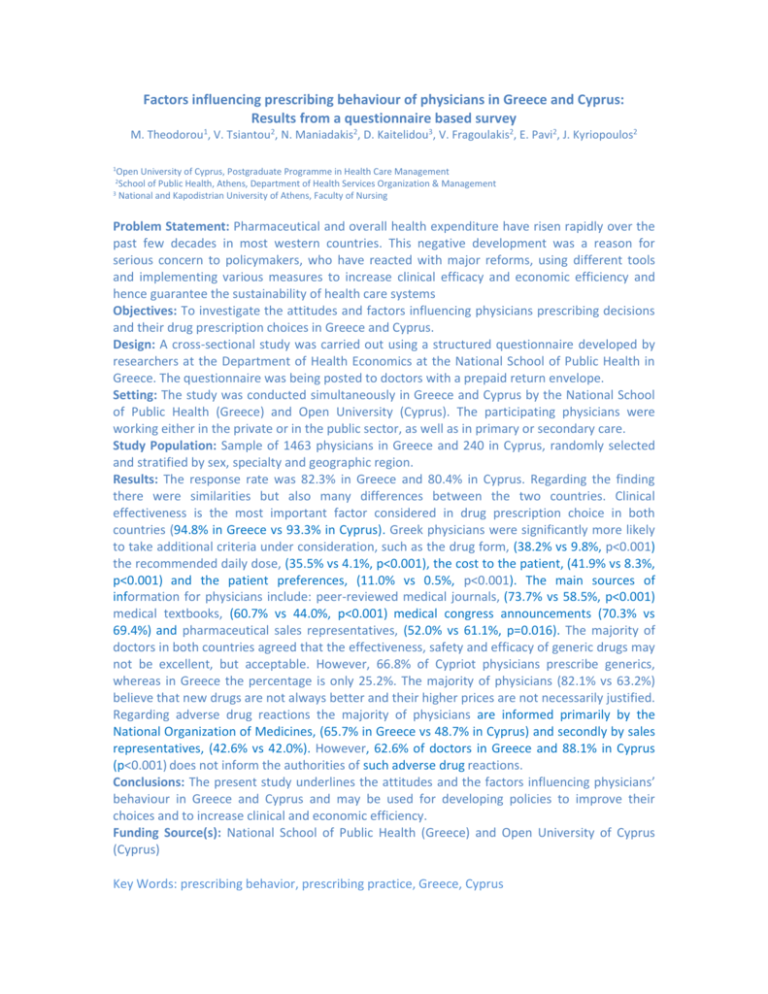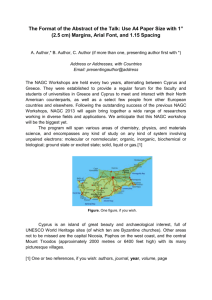Factors influencing prescribing behaviour of physicians in
advertisement

Factors influencing prescribing behaviour of physicians in Greece and Cyprus: Results from a questionnaire based survey M. Theodorou1, V. Tsiantou2, N. Maniadakis2, D. Kaitelidou3, V. Fragoulakis2, E. Pavi2, J. Kyriopoulos2 1Open University of Cyprus, Postgraduate Programme in Health Care Management School of Public Health, Athens, Department of Health Services Organization & Management 3 National and Kapodistrian University of Athens, Faculty of Nursing 2 Problem Statement: Pharmaceutical and overall health expenditure have risen rapidly over the past few decades in most western countries. This negative development was a reason for serious concern to policymakers, who have reacted with major reforms, using different tools and implementing various measures to increase clinical efficacy and economic efficiency and hence guarantee the sustainability of health care systems Objectives: To investigate the attitudes and factors influencing physicians prescribing decisions and their drug prescription choices in Greece and Cyprus. Design: A cross-sectional study was carried out using a structured questionnaire developed by researchers at the Department of Health Economics at the National School of Public Health in Greece. The questionnaire was being posted to doctors with a prepaid return envelope. Setting: The study was conducted simultaneously in Greece and Cyprus by the National School of Public Health (Greece) and Open University (Cyprus). The participating physicians were working either in the private or in the public sector, as well as in primary or secondary care. Study Population: Sample of 1463 physicians in Greece and 240 in Cyprus, randomly selected and stratified by sex, specialty and geographic region. Results: The response rate was 82.3% in Greece and 80.4% in Cyprus. Regarding the finding there were similarities but also many differences between the two countries. Clinical effectiveness is the most important factor considered in drug prescription choice in both countries (94.8% in Greece vs 93.3% in Cyprus). Greek physicians were significantly more likely to take additional criteria under consideration, such as the drug form, (38.2% vs 9.8%, p<0.001) the recommended daily dose, (35.5% vs 4.1%, p<0.001), the cost to the patient, (41.9% vs 8.3%, p<0.001) and the patient preferences, (11.0% vs 0.5%, p<0.001). The main sources of information for physicians include: peer-reviewed medical journals, (73.7% vs 58.5%, p<0.001) medical textbooks, (60.7% vs 44.0%, p<0.001) medical congress announcements (70.3% vs 69.4%) and pharmaceutical sales representatives, (52.0% vs 61.1%, p=0.016). The majority of doctors in both countries agreed that the effectiveness, safety and efficacy of generic drugs may not be excellent, but acceptable. However, 66.8% of Cypriot physicians prescribe generics, whereas in Greece the percentage is only 25.2%. The majority of physicians (82.1% vs 63.2%) believe that new drugs are not always better and their higher prices are not necessarily justified. Regarding adverse drug reactions the majority of physicians are informed primarily by the National Organization of Medicines, (65.7% in Greece vs 48.7% in Cyprus) and secondly by sales representatives, (42.6% vs 42.0%). However, 62.6% of doctors in Greece and 88.1% in Cyprus (p<0.001) does not inform the authorities of such adverse drug reactions. Conclusions: The present study underlines the attitudes and the factors influencing physicians’ behaviour in Greece and Cyprus and may be used for developing policies to improve their choices and to increase clinical and economic efficiency. Funding Source(s): National School of Public Health (Greece) and Open University of Cyprus (Cyprus) Key Words: prescribing behavior, prescribing practice, Greece, Cyprus








